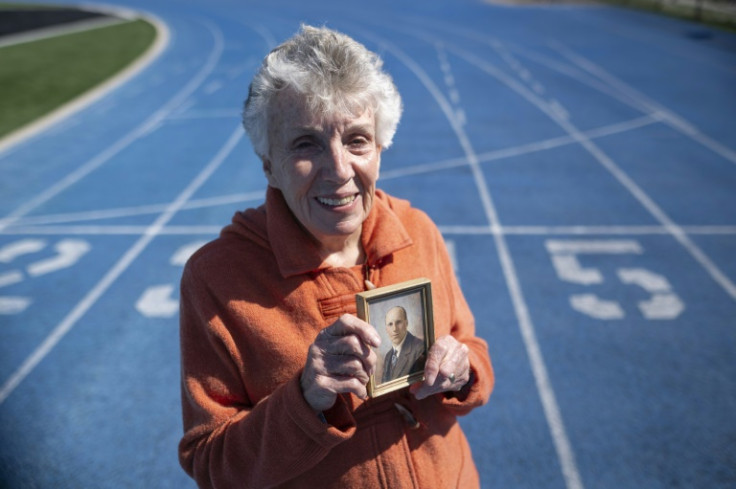Memory Of 'Chariots Of Fire' Hero Liddell Burns Bright For Daughter

Patricia Russell was only six when she said farewell to her father Eric Liddell for the final time but she retains fond memories of the athlete immortalised in the Oscar-winning film "Chariots of Fire".
Russell, a witty 88-year-old former nurse, was born long after her Scottish missionary father surged to 400 metres gold a century ago at the 1924 Paris Olympics, having famously refused to run his favoured 100m because the heats were on a Sunday.
On Wednesday, Matthew Hudson-Smith bids to become the first Briton since Liddell 100 years ago to be crowned Olympic champion in the event and in the same city.
As the 1981 film shows, British teammate Harold Abrahams took the 100m gold in Liddell's absence.
Team chiefs had tried to convince him to change his mind but Russell said that although her father was "no Bible thumper", in Scotland in those days, Sunday really was a day of rest.
"He was really a rather liberal Christian," she told AFP in a phone interview from her home near Toronto, Canada.
"He certainly did not give up his principles for a gold medal.
"I think if they had persuaded him to run he would not have won. It would have been a clash as he would have run thinking he had sold his soul."
In 1991, Russell handed Liddell's medals -- his 400m gold and 200m bronze were posted to him after the Games -- to Edinburgh University, which retains them.
The mother of three recalls another race in China where the family lived when Liddell was a missionary.
"It was a children and fathers' race... I had to hand a handkerchief to him and he would finish the race.
"I came racing down the track but I had a lovely hankie and I wanted to keep hold of it so I wouldn't give it to him.
"I did not get a lecture from him but he told me the hankie might be nice but the race was about teamwork.
"Sometimes those things stick."
While his work in China took him away from home for long spells there was a final idyllic family summer holiday in Carcant, Scotland, in 1940.
It was all the more special as Canadian mum Florence, who was nine years Liddell's junior, Patricia and sister Heather had to run the risk of a war-time crossing of the Atlantic.
"I remember Carcant was overrun with rabbits," she said.
While out walking with his daughters, Liddell caught one.
"He shook it and said 'rabbit pie for supper!'" Russell recalled. "Heather was a little more sensitive and she burst into tears so he said to mum 'I won't do that again'. But imagine the speed he had to catch a rabbit!
The first leg of the trip back to China in a 50-ship convoy brought a stark reminder of the fragility of life as U-boats sank five ships.
"I said to Dad 'we should go and help those in the water', but he said 'no it is too risky' and someone pointed out a periscope.
"As children you do not realise how serious the situation is but our parents... said to us 'do exactly as you are told and don't get silly'."
With Florence pregnant with her third daughter, Maureen, and Japan increasingly bellicose, Liddell decided it was best for her and the children to return to Canada in 1941.
Russell remembers her father taking her onto his knee and saying: "Be a good girl. You are the eldest, you look after your mum and sister and the baby until you see me again."
Those would be the final words he uttered to her.
Liddell ended up in an internment camp after Japan entered World War II and letters -- restricted to 25 words -- from him were sporadic. In one case every word had been blacked out by the Japanese censor.
Russell, though, always thought "her fun dad who had sparkle" would walk through the door, until she came home to a deathly quiet in Toronto on May 1, 1945.
"I asked my grandmother where Mum was and went up to the bedrooms.
"Mum was sitting there with Maureen and Heather, and she said 'Daddy died' (of a brain tumour). I said 'no, no I think they made a mistake'.
As the world celebrated, just before Victory in Europe Day, her mother was "in shock, a widow with three young children."
Russell said her grief at her father's death had been eased by meeting with former internees many years later.
"I met children who were in that camp and they told me how his presence had altered their lives.
"It is some consolation to know he was well-loved there, but what a waste."

© Copyright AFP 2024. All rights reserved.











